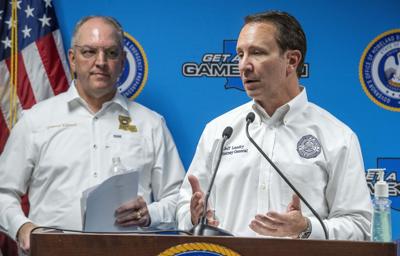The Louisiana Supreme Court has vacated a judge’s ruling that a petition used by state House Republicans to revoke all of Gov. John Bel Edwards’ coronavirus restrictions is unconstitutional, saying the judge prematurely ruled on the constitutionality of the move.
The Supreme Court did not rule on the merits of the appeal by Republican Attorney General Jeff Landry, who challenged 19th Judicial District Judge William Morvant’s ruling last month.
Instead, the court wrote in a ruling that Morvant “erred in reaching the issue of constitutionality prior to determining whether the dispute could be resolved on non-constitutional grounds.” For “well over a century,” the court has declined to rule on the constitutionality of laws unless the question of whether the law is constitutional is essential to the decision, the ruling said.
“While we acknowledge this case presents some novel issues which are important to the citizens of our state, we find it is unwise to depart from this bedrock principle of orderly statutory interpretation,” the court said. “Rather, it is critical a case must reach this court in the proper procedural posture to warrant our review of a ruling on constitutionality.”
Edwards' top attorney, Matthew Block, in a statement reiterated the governor's argument that the Legislature did not properly consult with health officials in issuing the petition, an argument that was not heard in court because Morvant only heard the constitutionality arguments. He also noted courts that have reviewed Edwards' restrictions have found them to be constitutional.
"Nothing about the Supreme Court's decision changes the fact that the mitigation measures remain in place and that they remain as important as ever," Block said. "The governor is confident that when the Supreme Court does ultimately hear the case, it too will uphold the Governor’s orders.”
Landry in a statement said the ruling "maintains that Louisiana is not a dictatorship." He said the law at issue is constitutional because of the Supreme Court's latest ruling, and the Legislature "continues to hold the power to terminate the governor's declaration of emergency by petition."
"By failing to comply with this Legislative directive, the governor has made his subsequent executive orders aspirational not enforceable," Landry said. "If the governor continues to act outside his legal authority, he only further confuses the public. The wise course of action would be for the governor to meet with the Legislature and establish common-sense guidelines which fall within the law.”
The petition, using an obscure and never-before-used state law passed in 2003 during the SARS pandemic, allows a majority of either the state House or Senate to end a public health emergency. In late October, 65 of 68 House Republicans signed onto the petition on the last day of a special legislative session aimed in part at loosening the state’s coronavirus restrictions. The petition said the governor couldn't issue new restrictions for a week.
In turn, Edwards, a Democrat, refused to follow through on the petition law, which calls on the governor to issue an executive order canceling his public health emergency. He filed a lawsuit, arguing the law was unconstitutional and that lawmakers didn’t follow it anyway because they didn’t consult with “the public health authority” in making the decision.
Morvant, during a chaotic Zoom hearing in early November, told both sides he didn’t believe he could rule on the merits of whether the petition could be enforced because the public health emergency it sought to end had already expired. Edwards had issued a new set of restrictions, as state law prevents him from issuing emergencies that last longer than four weeks.
“As far as I can tell (the public health emergency) expired on its own,” Morvant said during the Nov. 12 hearing. “There’s nothing to terminate because it terminated on its own.”
“I don’t know what relief I can give to anybody on these,” he said.
The attorneys for the governor and attorney general both voluntarily dismissed their requests for preliminary injunction. Then, Morvant ruled that the law allowing the petition was unconstitutional because it didn’t involve both the House and the Senate, which is required to pass laws. The state Senate has refused to sign onto a similar petition ending all virus restrictions.
“The Legislature gave the governor the authority to make these proclamations and issue them and they would have the force and effect of law,” Morvant said. “The existence of any legislative power is not on the Senate or House acting alone, but by the concurrent action of both houses.”
Staff writer John Simerman contributed to this story.


